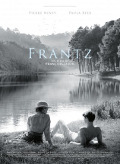
Directed by
Francois Ozon
113 minutes
Rated M
Reviewed by
Bernard Hemingway

Frantz
Synopsis: Shortly after World War I, in a small German village, Anna (Paula Beer) goes each day to the grave site of her fiancé, 'Frantz, who was killed in France. One day, Adrien (Pierre Niney), a young Frenchman, also comes to lay flowers on the grave. Gradually Anna discovers the story of his connection to her lost love.
We know from films such as Angel (2007) and 8 Women (2002) that François Ozon is a splendid aesthetician. His latest film, Frantz, is in many ways his most sophisticated achievement to date in this respect. We also know that beautiful visuals do not in themselves make for a satisfying film. Frantz is, however, not only a film that looks ravishingly good, it is both an intriguing story and a touching testament to the tragedy of war.
Whilst much of the latter, and probably a good deal of the former, no doubt is due to the fact that Ozon's film is a remake of Ernst Lubitsch’s 1932 film, Broken Lullaby (Lubitsch gets a writing credit here), Ozon and cinematographer Pascal Marti, shooting largely in black-and-white which is,of course, the primary format in which we know the era visually, meticulously reproduce the fashions and décor of the period as well as the provincial old world setting of the story..
There is very little direct reference to the immediately past war, no more than some bombed-out buildings and the occasional maimed returned soldier seen in the street. The overwhelming emphasis is on the damaged psyche of all involved: Anna, Adrien, Frantz’s parents and in a general sense the nations of France and Germany. It is a beautifully-realized study, sombrely restrained and imbued with a Romantic fin-de-siècle melancholy. Thus, Anna and Adrien share a love of Rilke and Verlaine and he recounts to her visits to the Louvre with Frantz and teaching him violin (Philippe Rombi’s Mahler-influenced soundtrack underscores proceedings well). It's a quietly measured story although Ozon comes very close to overdoing the wan aestheticisation,so much so, that I was at times reminded of Withnail & I’s Uncle Monty and his “sensitive crimes”. The film does not however go in the direction you expect. Instead, after a big reveal, it shifts attention to Anna and her uncertain attempts to wrest something good out of the tragedy that has shattered so many lives. Even here the film does not go in the direction in which you might expect and this sets it well above the usual Hollywood sentimentalities.
In the lead, newcomer Paula Beer, with her simultaneously child-like and erotically-yearning face and her quietly vulnerable demeanour is both captivating and, aided by the careful wardrobe design, looks the part. On the other hand, although Pierre Niney is right in the latter department his Adrien feels a little too much of a type (one which acknowledges itself late in the film when Anna visits the Louvre) rather than a flesh-and-blood character. This is not a major debility however, for the film which had its ultimate origins in a 1930 play by Maurice Rostand, is essentially a poetic reflection on the senseless tragedy of war and the ceaseless human quest for spiritual renewal. Ozon brings this message home at the same time as giving us an aesthetic delight. What more could you want?

Want more about this film?


Want something different?




